OK, to all you non-parents out there … I am going to go out on a limb here and share a secret held by us on the other side — misery loves company, so when one of us tells you, “My children are the best thing that has ever happened to me,” or some similar thinly veiled ploy to have you come join us in Suckville — don’t you believe it! The reality is we likely miss you dearly, yet there is no reasonable escape from the trap of our new reality, and our only hope is to trick you into coming along. Like someone drowning — clinging on for dear life — we are ready to take you down with us. Therefore, it should be no surprise that a recent study out of the Indiana University—Purdue University Indianapolis by Leslie Ashburn-Nardo suggests child-free adults consistently face moral outrage from their childbearing counterparts. The hard truth is, many of us dream about our prior lives sans kids. Often kids aren’t fun, and many of us long for pieces from our previous autonomous lives.
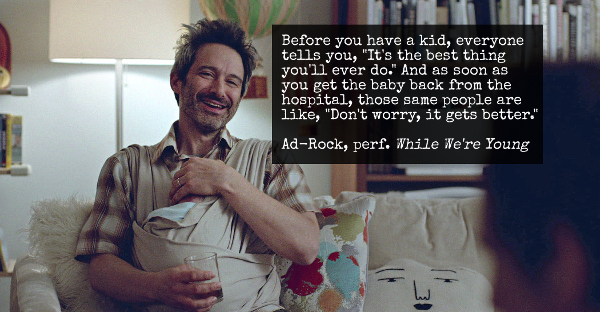
Joking aside, I love my kids. There are moments when it is really fun being a parent. My kids bring me occasional joy; they most certainly give my life a sense of meaning and purpose that was not there before. Like many other parents, I do my best to juggle priorities and sacrifice my own needs for theirs. Being a psychology geek, I truly enjoy watching them develop and thrive. Parenthood gives me a sense of accomplishment; there is no question I love my kids. Surely, I must be happier with two little bundles of joy in my life. Right? Right?!?
The Parenting Happiness Gap
Not according to science; research studies from different parts of the developed world have been suggesting for some time now that people with kids are less happy than their non-parent counterparts. So if you have been struggling with the self-actualization that your new life parenting is not as fun as you thought it would be … don’t stress; you are in good company. Those who have read Dan Gilbert’s Stumbling on Happiness or All Joy and No Fun by Jennifer Senior are probably already familiar with some of the previous science. Important to note, this does not mean that parents are (necessarily) unhappy. It just verifies that there is a happiness gap between the two groups. To put it more bluntly, when your ex-drinking buddy tells you, “My kids make me so happy,” they’re probably full of shit. This is especially true here in the United States. More than other countries in the world, there appears to be a strong link between parenthood and lower emotional well-being in the United States.
I’m not trying to be a polemicist. As I previously suggested, there is abundant research to support this claim (see Glass, Simon, & Andersson, 2016 for a comprehensive list of studies). For example, research published in 2005 in the Journal of Health and Social Behavior suggests that having children is associated with decreased mental health. This work also suggests parents report significantly higher levels of depression than their childfree counterparts.
“Don’t Worry, it Gets Better” Might Be a Lie, Too
According to Ranae Evenson of Vanderbilt University and Robin Simon of Florida State University, even empty-nesters have trouble reaching the levels of happiness experienced by non-parents. This is unfortunate interesting since many people believe that once their children are all grown, parenthood is more enjoyable. A meta-analytic review published in the Journal of Marriage and Family suggests that, after having children, couples actually report being less satisfied with their marital relationship compared with non-parents (Twenge, Campbell, & Foster, 2003). Twenge, Campbell and Foster conclude that lower marital satisfaction might be due to new role conflicts from the change in family dynamics, as well as the increased autonomy that comes with the empty nest. In other words, you wake up from Suckville and realize you still want to go to Burning Man, only to discover your partner would now rather watch “The Good Wife” reruns.
In a nutshell, science shows us (once again) what we already know but for some reason decided to kid ourselves about: being a parent is hard fucking work. While fantasizing about the birth of a child, we usually look forward to personal gratification, meaning, and purpose. Still, these positive emotions are fleeting and ultimately get eclipsed by the wide variety of stressors associated with childcare. These underestimated stressors can often lead to a poorer sense of well-being (Umberson & Gove, 1998).
The United States + Kids = Suck
From all over the globe, those who romanticize parenthood still acknowledge the stressors connected with parenting, but it seems like parenting is especially hard here in the United States. I have dug into the research, and stress theory has failed to explain why American parents feel worse than their counterparts in other countries (Glass, Simon, & Andersson, 2016). Many experts agree that the reason American parents report less happiness than parents in other countries is a lack of parenting support (when compared to collectivist cultures) and the lack of support offered by governmental programs (e.g., family leave, significant tax breaks, etc.). While in some developed countries, childbearing brings a number of social and financial benefits — well, let’s face it, the United States simply fails miserably here.
A group of researchers looked into resources provided to parents in different countries and examined whether the happiness gap between parents and non-parents was smaller in countries that provided more family assistance. They confirmed that the (distal) source of parenting stress generally originated in the respective countries’ social, economic, and policy constraints. They referred to this as the macro-level cause of parental negative emotions. Their analysis showed that out of 22 OECD countries, the greatest happiness gap between parents and non-parents was experienced in the United States.
In fact, we American parents report being 12 percent less happy than those without children. In contrast, countries that provided more resources and social support for parents (paid work leave, work flexibility, subsidized childcare) generally had a smaller disparity in happiness between parents and non-parents. Truth be told, in some countries (e.g., Spain, Portugal, Sweden, and Russia), parents actually reported being as happy (even slightly happier sometimes) as their non-parent counterparts (Glass, Simon, & Andersson, 2016).
Modern Family
Another factor is parenting does not have the social value and esteem attached to it that it did 50 years ago. We can now decide for ourselves when to have children. That is why some social scientists argue that when we compare people with children to non-parents, we are, in fact, comparing two groups of people who made different choices and have different attributes and preferences. Admittedly, the science here is as messy. It might, therefore, be more relevant to compare people’s happiness before and after they have had kids.
Professor Andrew Clark of the Paris School of Economics and his team authored the book The Origins of Happiness, which looks at the determinants of well-being in four countries: the United States, Germany, Australia, and the U.K. They presented some of their findings at the Wellbeing Conference 2016 (organized by the OECD and the London School of Economics). After four years of following new parents, their preliminary findings reaffirm that parenthood does not improve subjective well-being in the long run. The positive effects only last for the first 12 months after the baby is born. Unfortunately, after that, the well-being score of parents starts to decline.
Is Being a Happy Parent Possible?
OK, so parenting can suck … but here we are … and we love our kids … so WTF should we do? The good news is parenthood does offer many opportunities for some of the most worthwhile moments of your life. We lose a lot of autonomy as parents, but we can choose to bring more joy into our lives through our children. A study led by Katherine Nelson, a psychologist from the University of California, Riverside, shows us again what we already intuitively know — that the relationship between parenthood and well-being is very complex. It is influenced by many factors, including: parenting style, emotional bonds between the parents, the child’s temperament, and age.
When evaluating parental happiness, we should look at the whole context; it is important to observe why and how we, as parents, become more or less happy. If we have “bought in,” we can experience positive emotions through our enhanced social roles (Nelson, Kushlev, & Lyubomirsky, 2014). Moreover, to counter the somewhat negative research on parenthood, Nelson and her colleagues demonstrated (in three studies) that parents (especially fathers — go dads!) can be happier and experience more meaning in life compared to non-parents (Nelson, Kushlev, English, Dunn & Lyubomirsky, 2013). So, being a happy parent is in the cards if you are ready to work.
Let’s explore how:
1) Allow Time for Unstructured Play
Play is a source of happiness for kids, as well as adults. It is baffling to me that kids seem like they’re continually being deprived of free play. We’ve become too dystopian. Some of the silliest fights I have with my wife are about my kids going outside because they might get dirty. “Yeah, no shit, that is part of the fun of going outside.”
Statistics show American children (as well as children in other developed nations) have less and less free time to engage in free play activities. Our kids’ lives are increasingly highly structured and controlled. There are reasons for this, sure, but I want you to think about some of your favorite childhood memories for a moment … they probably involve at least some images of unstructured play, shenanigans with friends, moments of a carefree existence … moments when you were not directed, because you were a kid!
How does this make me happier? If we are always helicoptering over our kids (more on that later), we have less autonomy. Autonomy makes us happy. Furthermore, Professor Peter Gray argues that the decline of free play importantly contributes to an increase in different psychopathologies among young people, including: anxiety, depression, narcissism, and difficulty focusing (Gray, 2011). In his writing, Gray (2014) suggests that children need to be allowed time to play freely, with other children and away from adults. So when we eliminate the autonomy out of our lives, and the lives of our children, we create a perpetual death spiral. It is a bitter pill to swallow, but your parenting style might be part of the problem.
We need to give children some space to express their personality, learn, develop their skills and build social interactions. In his book, Free to Learn, Gray further explores these concepts and looks for ways to improve children’s happiness and the potential to learn.
The first rule of being happy (and raising a happy person) appears to be giving your kid some space. Let them play freely and get absorbed in some self-directed activity that has not been organized for them. It is good to have fun with your kids, but if one or both of you are not having fun anymore, it is counterproductive. Letting your kid-free play also helps you recharge and have more fun during the time you do share experiences.
2) Don’t Make Play Your Duty
When you do play with your kids, avoid engaging in it as a sense of obligation. Play should be fun for everyone involved. Otherwise, it is not play. Hey … I get it, singing “Frozen” karaoke for the nth time isn’t your idea of fun.
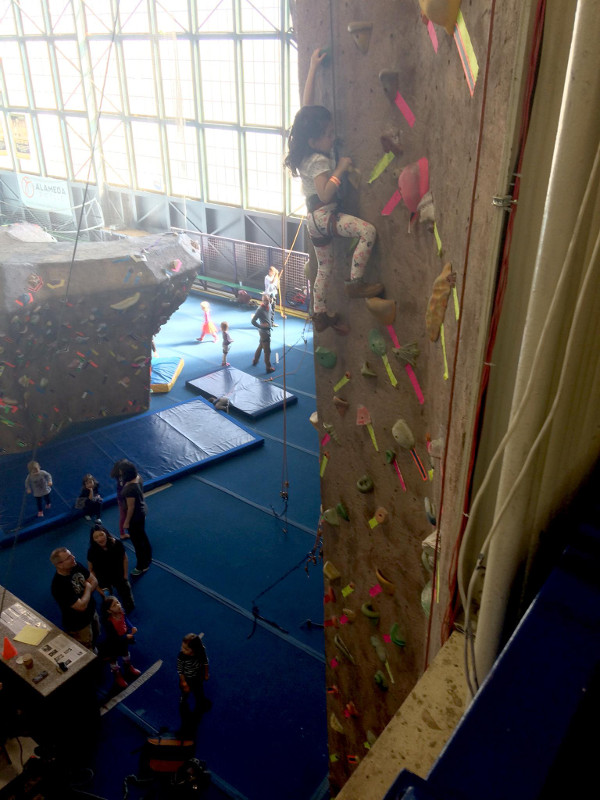
3) Consider the Implications of Helicopter Parenting on Well-Being
Terri LeMoyne and Tom Buchanan of the University of Tennessee at Chattanooga explored the style of “helicopter parenting” on a sample of college students. They found that helicopter parenting can have a negative effect on children, lowering their levels of well-being and making them feel more negative about themselves. Children of helicopter parents are also more likely to take medications for anxiety and/or depression (LeMoyne & Buchanan, 2011). Ill effects of over-parenting were also shown in other studies. For instance, one led by Chris Segrin of the University of Arizona, Tucson, highlighted that helicopter parenting can lead to the child having difficulty relating to others (Segrin et al., 2014). Science shows us that although a caring and genuine relationship is essential for our children’s well-being, they (and we) will probably be happier if we give them less direction. Again, make sure your parenting style is not the culprit. When the time is right to play with your kids, let them guide you and generally only intervene for reasons of safety and security.
4) Don’t Take Life Too Seriously, No One Gets Out Alive Anyways
If you constantly strive to be a flawless parent, then my guess is you are probably not having much fun anyway. Having parental standards is important, but try your best not to turn this into perfectionism. There are rewards for being a flexible parent. Studies show that authoritarian parents who are high on demands and low on responsiveness tend to have children who have low self-esteem and are overly worried about making mistakes (Hibbard & Walton, 2014). Nicholas Affrunti and Janet Woodruff-Borden from the Department of Psychological and Brain Sciences at the University of Louisville also suggest that parental perfectionism and over-control can be risk factors for the development of child anxiety (Affrunti & Woodruff-Borden, 2015). So embrace your silly side.
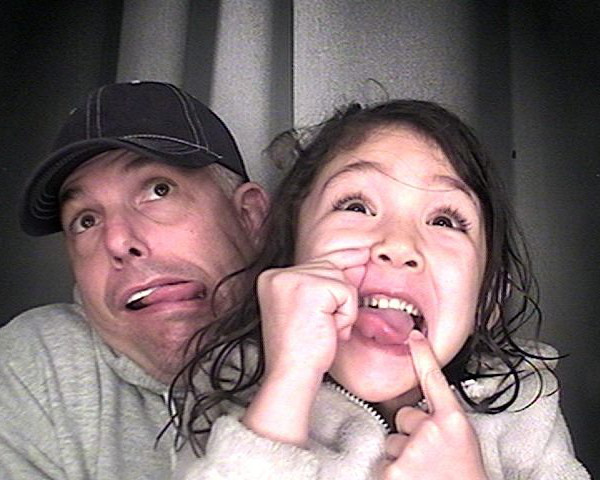
Deploy a little healthy code-switching and become a kid yourself during play. The practice can be healthy for all involved. There is inherent fun in getting silly and laughing with someone. You both release oxytocin, which in turn creates strong bonds with each other, which in turn makes you feel good — plus a host of other benefits that contribute to the well-being of both parent and child.
5) Create Fun Rituals
This is one I have borrowed from my best friend Micah and his family. I am trying to get better at this one, but in the spirit of authenticity, I must admit I have failed a bit here. The recognition that routine “family time” is important for family relations and well-being is well-established. Weekends play an important and beneficial role in the lives of many families in this regard — they give us more time to do things together. Rosalina Pisco Costa, a sociologist working at the University of Évora in Portugal, writes about the creation of “special time and space” and family rituals. Family rituals can center around different things (celebrations, greetings, trips) and involve the stages of anticipation, experience as well as conclusion (Costa, 2014). Costa also cites the work of Imber-Black and Roberts (1998), who suggested that “rituals give us places to be playful, to explore the meaning of our lives, and to rework and rebuild family relationship” (p.4). Fun rituals are something we can consider including in our family life to experience the emotional benefits they bring. Circling back to Micah and his family, they invested in a boat knowing that the significant cost would ensure that maritime activities, such as weekly sleepovers on the new boat, would become the norm and create endearing memories for all.
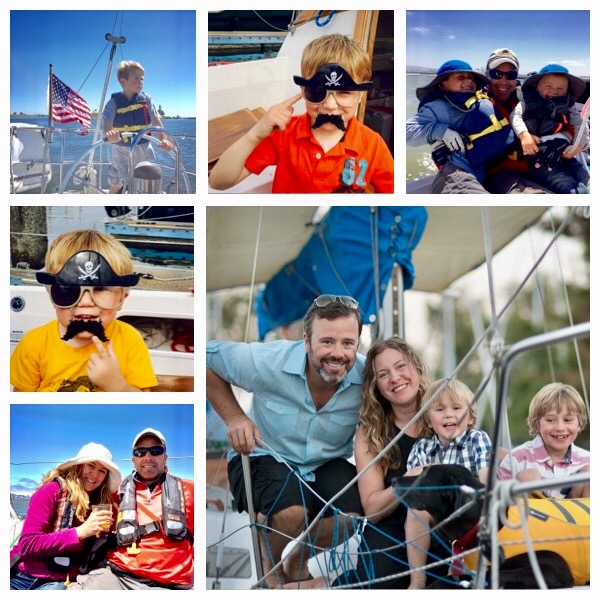
I am not suggesting you go out and buy a boat. I am suggesting you make family time a habit by engaging in a family ritual the whole family enjoys.
6) Invest in Experience, not Things
I feel like this has been covered well recently by others (see: Buy Experiences, Not Things or The Science Behind Why You Should Spend Money on Family Holidays Instead of Toys) and is almost a cliché topic now, but it is still worth a mention. Investing in experience over things builds memories that all parties can relish. Furthermore, since you likely have some control of your family’s resources, choosing an experience over buying another toy interjects some autonomy back in your life. We know the benefits from experience last longer than the gratification derived from most tangible things. Moreover, you don’t have to succumb to the pressure of going to a child-centered destination like Disneyland for your family vacation. What is an experience that would create an enjoyable, lasting memory for all involved? If you plan your vacations accordingly, you can mitigate the ill-conceived adage: children make a family, but destroy the marriage. Pick a location where the tips from 1-5 (above) are baked in. For instance, you could choose an all-inclusive resort with a drop-off kids’ club so there are opportunities for kid-centered fun, as well as freeing up time for intimacy with your partner while your kid(s) is at play. Fun for all!
The Days Are Long, But The Years Are Short
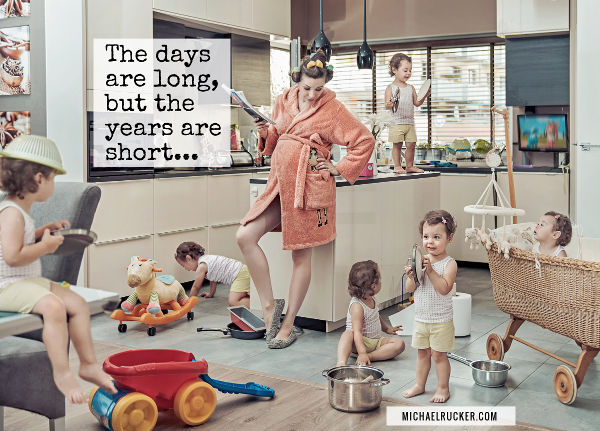
If you are lucky enough to find unwavering fun in being a parent … I am happy to hear that unicorns exist … something for me to strive for. For the rest of us, we tell our friends, “Don’t worry, it gets better,” because it can … especially if we are able to parent mindfully. Life is about moments, and as parents, we have committed to a lot of those moments being with our kids. Either by choice or lack of family planning, these moments are not just ours anymore. However, we still hold a few cards. We can influence our environment and our family time to maximize our ability to have fun and be happy (along with our kids).
Parenthood can easily become a shitshow at times, but we have more control over that than we think. The days are long, but the years are short — we might as well stack the deck in our favor, so in our final days, we have a lifetime of fun fond memories, and we can relish in a family life lived happily.
Sources & further reading:
Gray, P. (2014). Playing with Children: Should You, and If So, How?. Psychology Today.
Nelson, S., Kushlev, K., & Lyubomirsky, S. (2014). The Pains and Pleasures of Parenting: When, Why, and How Is Parenthood Associated With More or Less Well-Being?. Psychological Bulletin, 140(3), 846-895.

In the discussion of parents whose children are not at home anymore, it did not mention grandchildren or the elderly and extended family. I wonder if perhaps with age comes a greater sense of happiness from having children, or at least a decrease in loneliness? Or, then again, maybe not.
Hi Alli, first thank you for taking the time to read my essay. I really appreciate it. My understanding is that becoming a grandparent does come with benefits, but I do not know enough about the science to give you a well-thought-out answer. I do remember Lesley Stahl speaking about the subject on NPR while promoting her book Becoming Grandma: The Joys and Science of the New Grandparenting. Her book might be a good read if this topic interests you.
This is a great article Mike. Have you seen this piece by Tracy Gillett? http://raisedgood.com/extraordinary-things-happen-when-we-simplify-childhood I think you’d enjoy it.